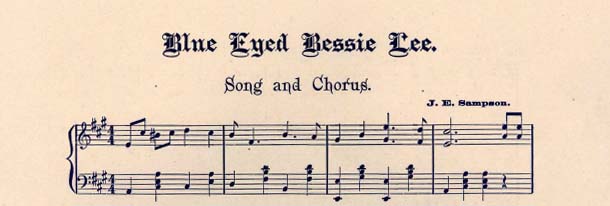
Historic Sheet Music Collection
Document Type
Score
Publication Date
1918
Lyrics
VERSE 1
The other day I chanced to meet
A soldier friend of mine,
He'd been in camp for sev'ral weeks
And he was looking fine;
His muscles had developed
And his cheeks were rosy red,
I asked him how he liked the life,
and this is what he said:
CHORUS
"Oh! how I hate to get up in the morning,
Oh! how I'd love to remain in bed;
For the hardest blow of all,
Is to hear the bugler call;
You've got to get up,
You've got to get up,
You've got to get up this morning!
Some day I'm going to murder the bugler,
Some day they're going to find him dead;
I'll amputate his reveille,
And step upon it heavily,
And spend the rest of my life in bed."
VERSE 2
A bugler in the army,
Is the luckiest of men,
He wakes the boys at five
And then goes back to bed again;
He doesn't have to blow again
Until the afternoon,
If ev'ry thing goes well with me
I'll be a bugler soon.
CHORUS 2
"Oh! how I hate to get up in the morning,
Oh! how I'd love to remain in bed;
For the hardest blow of all,
Is to hear the bugler call;
You've got to get up,
You've got to get up,
You've got to get up this morning!
Oh! boy the minute the battle is over,
Oh! boy the minute the foe is dead;
I'll put my unifor away,
And move to Philadelphia,
And spend the rest of my life in bed."
Recommended Citation
Berlin, Irving, "Oh! How I Hate to Get Up in the Morning" (1918). Historic Sheet Music Collection. 1759.
https://digitalcommons.conncoll.edu/sheetmusic/1759
The views expressed in this paper are solely those of the author.
Comments
Irving Berlin's Bugle Song
Waterson, Berlin & Snyder Co., Music Publishers
Strand Theatre Bldg., Broadway at 47th St., New York
Dedicated to my friend "Private Howard Friend" who occupies the cot
next to mine and feels as I do about the "bugler."
Copyright MCMXVIII by Waterson, Berlin & Snyder Co. Strand Theatre Bldg., B'way, N.Y.
Copyright Canada MCMXVIII Waterson, Berlin & Snyder Co.
International Copyright Secured
Some of these resources may contain offensive language or negative stereotypes. Such materials should be seen in the context of the time period and as a reflection of attitudes of the time. The items are part of the historical record, and do not represent the views of the library or the institution.